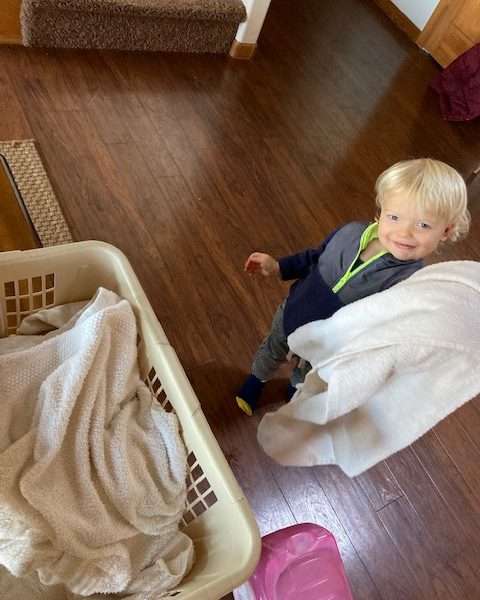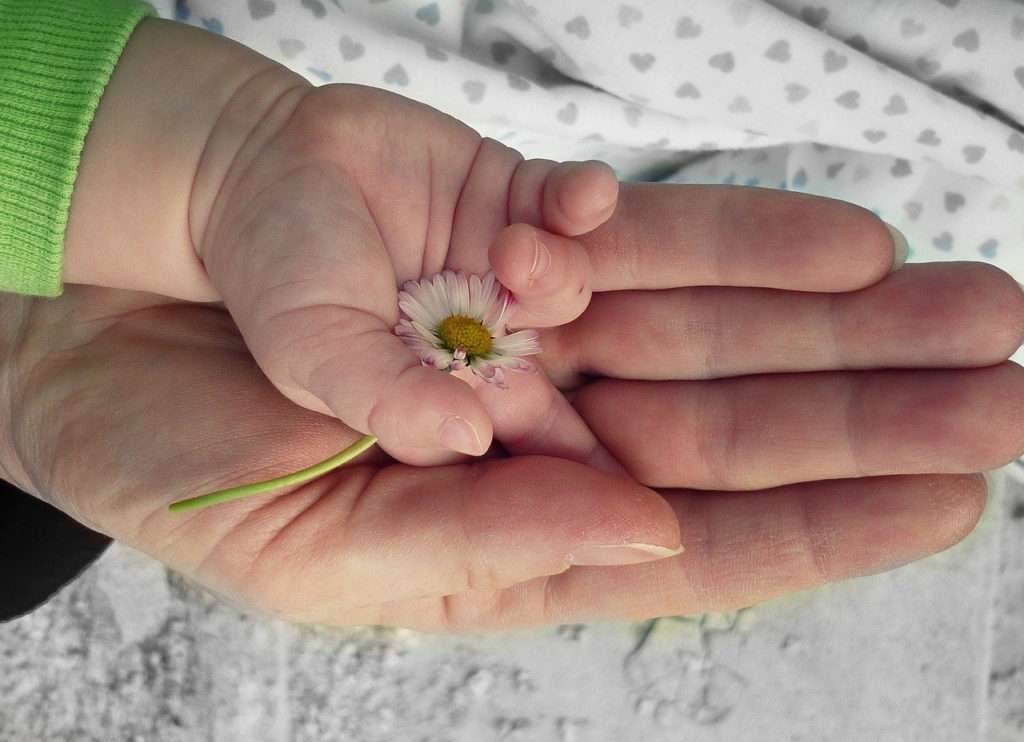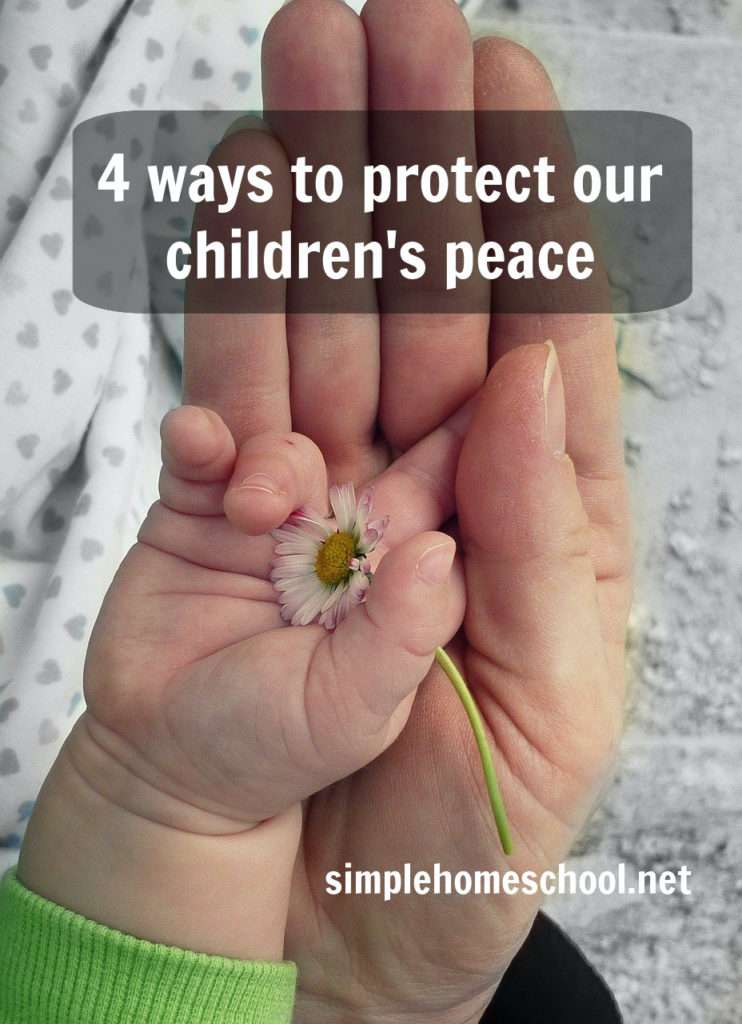As I write these words, our family has had an incredibly stressful few weeks.
The details don’t matter here (it’s not election related, but being a week overdue with our 4th child is a certainly a factor!), because as I listen to others it seems everyone is facing these “unprecedented” levels of stress. Can you relate?
I’ve also noticed this: Children are being sucked into this stress. Recently I heard a 3-year-old mention his stance on a controversial issue. A 3-year-old? Another day I heard a child who is too young to read say, “So-and-so (political figure) is SO TERRIBLE.”
Wait, what? Why are our smallest children exposed to such things?
Would you prefer to listen to this post?
I don’t mean to throw stones–I feel the struggle! We have an almost 14-year-old who is taking both Speech & Debate and American Government classes and who LOVES researching and discussing (read: debating) current events. Both of our older kids begged to watch the Presidential Debates, then they watched debates from the past (1960 and 1992) to compare and discuss. We had some great discussions!
But finding a healthy balance, especially with younger children, is crucial. I’ve been returning often to the principles from Simplicity Parenting (afflink), as they ring true more than ever before!
Payne discusses Cumulative Stress Reaction (CSR) and the damaging impact of small, compounded stresses on children’s educational growth and development, causing symptoms akin to PTSD.
His book addresses several sources of these stresses and he offers fantastic recommendations for simplifying a child’s world in order to return to peace and calm. In other seasons, I’ve paid more attention to his words on over-scheduling. Too many extra-curricular activities crammed into a child’s life creates cumulative stress.
Well, 2020 has virtually wiped out most extra-curricular activities. And yet, the stress still seems to soar.
This time around, chapter six has hit home: Filtering Out the Adult World.
Payne opens the book with the story of an 8-year-old whose “understanding of global warming seemed to rival Al Gore’s.” This anxious little fellow was exposed to news daily and included regularly in political discussions with his parents.
Information on current events poured into their home through the computer and TV. Over time, he developed stomach aches, trouble sleeping, and anxiety. His teachers reported significant challenges at school.
Under Payne’s direction, his parents took steps to drastically simplify his environment, specifically to filter out the adult world. They recognized that too-much-information for a too-young child had created a stress-disorder. They saved the news and current-event discussions for after he was in bed.
Within 3-4 weeks they noticed a dramatic improvement in their son. He could eat, sleep, and learn better. He spent more time outdoors playing. He was less anxious.
Our role as parents and educators isn’t only to provide great books, games, and learning materials. We must protect our children’s peace, these precious ones who are experiencing 2020 through a significant time of development in their lives.
4 ways to protect our children’s peace:
1. Protect our own emotional health.

Payne states it clearly: “Children feed off their parents’ emotions.” A few days ago I overheard my two-year-old saying, “Mama sad.” Of course there’s nothing wrong with him making this observation, but it alerted me to the fact that he’s much more aware of my emotional states than I realize.
For his sake I need to be mindful of what I’m allowing into my heart and mind.
I see this most clearly with media intake. Sometimes picking up that phone, again, is like pouring poison into my mind.
I recently did a 40-day break from all social media and shared some of the benefits here. I might think a few quick doses of news during the day is harmless, but as Payne says, it’s the cumulative stress reaction that causes disorder.
He urges parents to reduce their own exposure to media, and particularly media news.
Of course, he’s not advocating crawling under a media-proof rock and disconnecting from the world, but he advises us to “limit or cut your use of those media that alarm rather than inform. It can make a dramatic difference in your emotional life, and the emotional climate of your home, when you refuse to let fear be provoked, stoked, and incited several times a day.”
Just think, he wrote this before 2020 was even a thing!
2. Keep adult topics limited to adults.
It can be tempting to want to include our children in all the complexities of our adult world, in an effort to better equip them for life. But this is far more damaging than helpful, when done at a too-young age.
One of our children is especially prone to anxiety, and not surprisingly, this is also the child who is constantly listening in and wanting to know what’s being discussed in adult conversations.
Part of helping her emotional stability has been firmly but lovingly not allowing her to be involved in adult concerns.

As Payne writes, “[Children] need to know that some things are for adults to discuss; they are not for kids to hear, or to comment on. Children need to see your self-restraint, your confidence in meeting your own world.”
It isn’t loving to expose a child to issues or concerns that are too weighty for their little hearts to handle, even if they express interest. Avoiding this is one simple way we can protect our children’s peace.
3. Guard our words.
My husband and I recently observed that 2020 is the year of complaint. It seems that the difficulties have given us all a pass to make unrestrained grumbling the accepted dialogue of our day. I know I’m guilty!
Because 2020 has been almost comically challenging, it’s easy to begin seeing the world through a dark lens of cynicism. This too is poison for our children’s peace!
Personally, I make Philippians 4:8 my mantra, because we naturally speak of what we think about. Another simple reminder we use in our home is to THINK before we speak.
Are my words:
True?
Helpful?
Inspiring?
Necessary?
Kind?
Simply put, our words shape the environment of our home.
4. Delight in the ordinary wonders of each day.

I remember hearing a preschool teacher say that you can tell a small child what she experienced that day.
In other words, as you tuck a small child into bed you can recount the simple joys of the day: “What a good day. Today we played outside and got all muddy! And we sang songs and had a yummy cheese sandwich and called Grandma on the phone. What a good day.”
Simply reflecting on the sweet, ordinary moments of each day helps cradle a child’s heart in peace as they fall asleep. This doesn’t mean we ignore hard things or brainwash them into pretending every day is great, but it’s true that how we reflect on each day greatly impacts our peace.
The truth is, there is some good and beauty in each day. There is something to be grateful for each day.
By intentionally recounting these sweet moments, we help to protect our children’s peace, as well as our own.
How about you? How are you protecting the peace of your children as you navigate your homeschool days? Please share!
What’s Your Homeschool Mom Personality? Take Jamie’s quiz now and receive a free personality report to help you organize your homeschool based on what your personality type needs most!



 Weekend homeschool links: Nov 13th
Weekend homeschool links: Nov 13th
Kari,
Thank you so much for sharing this post. It couldn’t come at a better time. I have seen so much inappropriate conversations in front of small children for quite some time this year. I think a lot of adults need to find their own safe space to let out their emotions, while feeling trapped at home. Talk to a friend or seek professional help from a counselor. Your child really should not be the sound board. Allow them to be children.
Unfortunately, I know the damage this can play personally. My own parents, in the midst of a struggling marriage, shared FAR TOO MUCH information with me when I was a young child. What they shared shaped how I saw both of them. It also made me aware of “adult” flaws and emotions I was not ready for. My mother would also gossip about others in my presence when I was younger. I can only imagine the awkwardness that was ensue had I repeated any of her gossip. Today, I am a mother myself and I do my best to safe-guard my daughter from a world that no longer understands boundaries. Our kids are exposed to way too much these days.
Sadly, the gossipy nature of my mother has not changed so I do have to safe guard my child in that respect as well.
Again, thank you for posting this. I think it is much needed.
Thank you so much for sharing this, Nadia. What a GREAT example of why this is so critical. I’m sorry you had to navigate all that as a child, I applaud you for being mindful of protecting your daughter!
Thank you for this write up very profound. Wishing you the best .
God bless
Thank you for sharing such timely wisdom and comfort. I really needed this post today. You must have been inspired. May many blessings find their way to you!
Thank you for putting into words what has been on my mind and in my heart lately <3 This has been such a tough year for our family, and we have all been affected by the constant worry and anxiety – as much as my husband and I try not to discuss things in front of the kids, it's hard not to carry those feelings with you throughout the day too. As we adjust to a completely new life in a completely new state, I've been working on what I want our rhythms to look like, and this is a great reminder to make peace the center of my planning. Also looks like I need to reread Simplicity Parenting again, thanks for the reminder! And congrats on your new baby boy!
I so needed to read this today. Our 6 yr old struggles with anxiety. He is the youngest of 4 children (the oldest 3 being teenagers). We have done many things to help him, including therapy, but I’ve had such an aha moment reading your article today! My husband and I comment often on how the enviroment he’s growing up in at home is so different from what it was when the oldest 3 were little. He wants to imitate his older siblings in everything, do what they do, speak how they speak. This has made him grow up too fast. Navigating dinner discussions with such a large age gap is tricky for us! I will definitely be taking an in-depth look at our life to see what changes we can make so peace can be the atmosphere in our home. Thank you!!